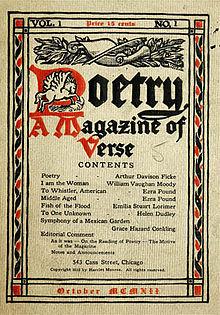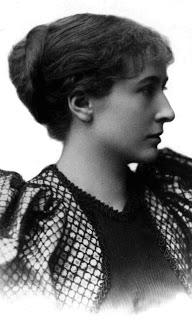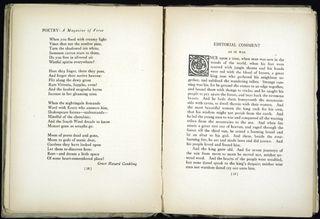 Love Your Literary Grannies: Today, we feature a tiny snippet about Harriet Monroe!
The name “Harriet Monroe” probably means nothing to you.
Love Your Literary Grannies: Today, we feature a tiny snippet about Harriet Monroe!
The name “Harriet Monroe” probably means nothing to you.
I knew I needed to feature her as a literary granny after reading her name over and over again and then realizing the impact she had on the rising popularity of new poetry, especially new and cutting edge poetry, is unmatched by anyone of either gender.
Harriet Monroe was the founding editor of Poetry Magazine. In a time of slumping subscriptions, her magazine continues to thrive and recently celebrated its 100th anniversary.
Miss Monroe worked for two years with no salary and continued to work during those two years as an art critic for the Chicago Tribune. When her work load became too heavy, she spent many years working for a minimal salary simply because she felt her work – and the importance of sharing poetic voices which might not have been heard without Poetry Magazine was of utmost importance.
I didn’t want to write a profile without reading more in depth of her life.
 Harriet Monroe - today's lovely literary granny early in her career.
Harriet Monroe - today's lovely literary granny early in her career.
I discovered she wrote an autobiography. I discovered it was out of print. I discovered it on a used book website. I bought a first edition for a very low price and was rarely as excited to get a book in the mail as I was for this one.
I am reading it slowly, many parts aloud, so I can get a feeling for the sound of her voice. There are few activities I enjoy as much as reading aloud and being read to, aloud. I don’t want to wait to introduce her to you, my dear readers. Just know there will be more coming in the future.
She was a poet herself, but her greatest contribution to the literary world was her magazine.
Laura Ingram in the Dictionary of Literary Biography wrote this of Miss Monroe’s legacy: "The abundant richness of this movement might well have been less spectacular without the encouragement and vitality which Poetry offered in those years when young poets were seeking to break the bonds of traditionalism and to create a new poetic voice for the modern age."
Her editorial policy was quoted in the second edition: “"Open Door will be the policy of this magazine—may the great poet we are looking for never find it shut, or half-shut, against his ample genius! To this end the editors . . . desire to print the best English verse which is being written today, regardless of where, by whom, or under what theory of art it is written."
 Pages from the First Volume of "Poetry" magazine
Pages from the First Volume of "Poetry" magazine
Without Harriet Monroe, poetry was dwindling in popularity. I am sure it would delight her to see poetry continues to be alive and well and hopefully will become even more alive and even more well known as we get to know our literary grannies, poetic and prosody and all other forms of writing as well.
I’ve barely started her memoir and yesterday I giggled about her correspondence with Robert Louis Stevenson, the author of Treasure Island and others. Usually I am all about literary grannies in April during A to Z, but since I got sidetracked then, I’m writing some additional profiles this July.
It’s important we know who came before us in the writing world – for all creative people, including you!
Enjoy this meandering throughout July – please let me know of any Grannies I should research and build a relationship with as well. I’m grateful, always, for your input.
= = = = =
 Please stay in touch:
Follow me on Twitter: @JulieJordanScot
Please stay in touch:
Follow me on Twitter: @JulieJordanScot
Be sure to "Like" WritingCampwithJJS on Facebook. (Thank you!)
Follow on Instagram
And naturally, on Pinterest, too!
